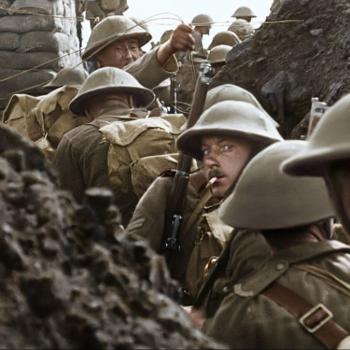My post the other day on the origins of WWII got me thinking about an article from Foreign affairs from a few years back arguing that various cognitive biases endemic in human psychology make people more likely to support going to war than is rationally justifiable. Here’s a sample:
Excessive optimism is one of the most significant biases that psychologists have identified. Psychological research has shown that a large majority of people believe themselves to be smarter, more attractive, and more talented than average, and they commonly overestimate their future success. People are also prone to an “illusion of control”: They consistently exaggerate the amount of control they have over outcomes that are important to them—even when the outcomes are in fact random or determined by other forces. It is not difficult to see that this error may have led American policymakers astray as they laid the groundwork for the ongoing war in Iraq.
Indeed, the optimistic bias and the illusion of control are particularly rampant in the run-up to conflict. A hawk’s preference for military action over diplomatic measures is often built upon the assumption that victory will come easily and swiftly. Predictions that the Iraq war would be a “cakewalk,” offered up by some supporters of that conflict, are just the latest in a long string of bad hawkish predictions. After all, Washington elites treated the first major battle of the Civil War as a social outing, so sure were they that federal troops would rout rebel forces. General Noel de Castelnau, chief of staff for the French Army at the outset of World War I, declared, “Give me 700,000 men and I will conquer Europe.” In fact, almost every decision maker involved in what would become the most destructive war in history up to that point predicted not only victory for his side, but a relatively quick and easy victory. These delusions and exaggerations cannot be explained away as a product of incomplete or incorrect information. Optimistic generals will be found, usually on both sides, before the beginning of every military conflict.
When you think about it, this sounds fairly obvious in a “why didn’t I think of that” sort of way. In pretty much every war at least one side and often both sides has miscalculated, overestimating its chances of victory or the cost of the war in blood and treasure (and I’m speaking here solely of prudential considerations, not of wars of conquest or aggression that, while they involved no miscalculation on the part of the aggressor, were still unjust).
Is America exceptional in this regard? Certainly we have a pretty good record of winning wars, and have been fortunate in avoiding the worst ravages of many of the conflicts we’ve been involved in. But if people at the time had known more or less how things would have turned out, would the war still have happened?
My sense is that, with benefit of hindsight, the U.S. would not have fought in the 1812, the Civil War, WWI, Korea, Vietnam or Iraq. We would have fought the American Revolution, the Mexican-American War, the Spanish American War, WWII, the Gulf War, and Afghanistan. So with benefit of hindsight, even the U.S. would have fought only about half as many major wars as it actually has.
That’s not all. The flip-side of the “when did we mistakenly opt for war?” question is “when did we mistakenly opt for peace?” When, if ever, would knowing what lay in store have made people chose to go to war when in actuality they chose peace? For the most part, all the examples I can think of: intervening earlier to stop Hitler, driving on to Bagdad in the Gulf War) all involve wars that actually happened. So it’s not really that war is considered preferable to not going to war, only that, had we known what was to come, we would have entered or ended the war differently. There is Rwanda: A lot of people think now that we should have intervened to stop the genocide. But other than that, if we look at all of the time the U.S. almost got into a war but didn’t (tensions with France and England in the 1790s, fifty-four forty or fight, the near war with Germany during the other Roosevelt administration, the Cuban missile crisis, etc.), I don’t get the sense that we would have been better off if we had. And if the U.S. had not gotten involved in the Spanish-American War, say, I doubt that people would look back on this decision with any regret.
Thoughts?











